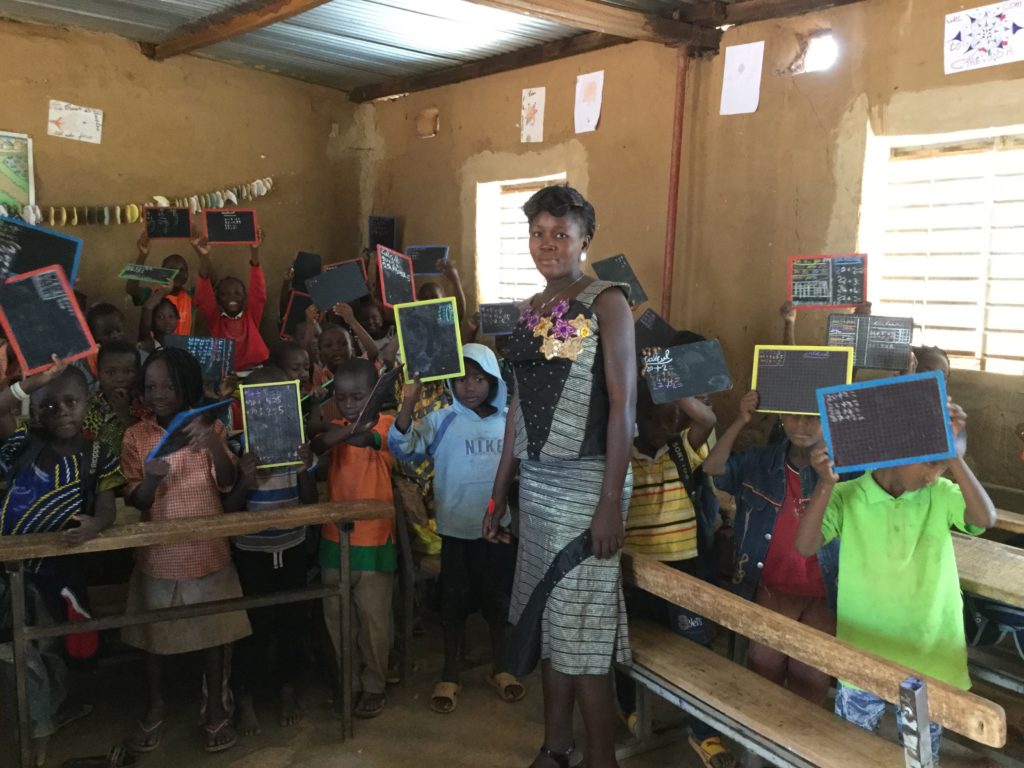by Corinne Brion
August, 2019
Neowongo! (Welcome in Moore, one of the 59 dialects In Burkina Faso, West Africa).
Tonight, I am leaving Burkina Faso. I am at Ouagadougou’s international airport reflecting on my experiences in the land of the ‘Incorruptible People.’ Burkina Faso is the size of Colorado and has 19 million inhabitants. It is a former French colony and like many countries in Africa gained its independence in 1960. Burkina Faso ranks 183 out of 188 on the Human Development index (which measures the capability of people to live long happy healthy lives, and to have access to education).
To better understand the educational needs of Burkina Faso, it is important to take into consideration the following data. Burkina Faso’s literacy rate—defined as people over 15 years old who can read and write—is 36% (CIA, 2016) and 3.4% of the Gross Domestic Product (GDP) is spent on education. Burkina Faso uses the French education models for all levels of education, unless the school is part of an international system. There are six levels of the elementary system exclusive of kindergarten (la maternelle). Kindergarten classes exist for children age three to six but they are mainly located in large cities and are under-developed.

I have been blessed to work in Burkina Faso for the past 5 years. Our task there has been to build the capacity of school leaders. School leaders in Low-Fee Private Schools (LFPSs) do not have any formal trainings and in most instances are not educators. Because a training is as good as its material and trainers, we developed contextualized research-based educational leadership materials in which adult learning theories are embedded, we train local school leaders, train local trainers through a Train the Trainers model (TOT) and conduct research.

This week, I have been overseeing a three-day leadership training that focused on the Conditions for Learning (Table 2 below outlined the topics covered during this three day leadership training). In order to enhance the transfer of knowledge post training, we conduct all trainings using an active approach. Trainees participate in a case study, work in groups and spend time reflecting about their schools. At the end of each day, participants complete also a School Development Plan or “Plan d’Action.”
The co-facilitators for the training were two Burkinabe colleagues who are still learning the materials and were working alongside a Ghanaian colleague and trainer. To find quality facilitators we work with local universities and schools. Our local-co-facilitators are carefully selected and are educators by training. Most of them are university professors in an educational leadership department. Each training is led by 2 facilitators who take turn between facilitating and being the lead and co-facilitating. We have developed Pedagogical Notes to outline the roles of the facilitator and co-facilitator. When potential facilitators first work with us, they come to the training and observe the entire training session. They also participate in daily debriefing meetings. If they remain interested in the work and content of the materials, they become co-facilitators the next time the training is offered and teach about 25% of the content and time. They are teamed up with an experience facilitator who can offer their support and feedback. Again, at the end of each day, there is a debriefing session that takes place with time for reflection. The second time a facilitator in training teach, they will facilitate for 50 % of the time and content. The third time they teach 75% and after that they become full-fledged facilitators. In addition to the daily debriefing and feedback sessions, the lead facilitators write feedback letters at the end of the training for his/her co-facilitator. To help with the letters and the language one should use in order to give constructive feedback, we developed a TOT guide that comprised sample letters, language, job descriptions as well as the selection process and the roles of both facilitators, co-facilitators and observers.

This evening after three intense days of training, I feel content. Participants were thrilled with the content of the modules, acquired practical ideas and tools to help them with their schools and networked with each other. Our local trainers are progressing in their learning and I had the chance to meet some leaders who had attended the training three years ago and continue to transfer the new knowledge to their schools. That is music to my ears!



















very good